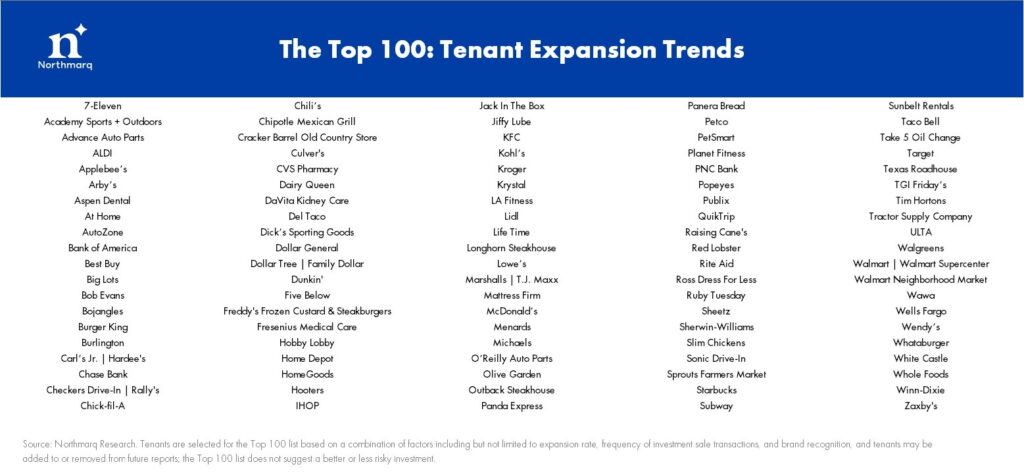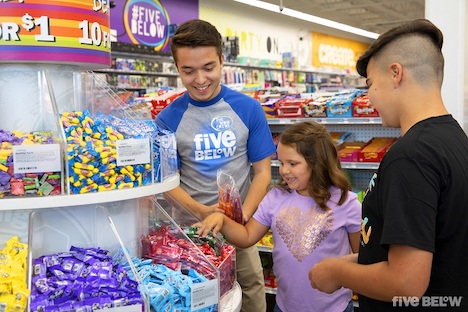By understanding the needs and preferences of the typical U.S. consumer, the most successful retail brands have evolved to deliver on these expectations. Today, significant expansion is underway across several diverse retail sectors including automotive, discount and dollar stores, fitness and sporting goods, and, of course, the dynamic restaurant industry.
While expansion in these categories isn’t necessarily a new trend, there have been some recent announcements that promise to contribute even more substantial growth than originally anticipated. Conversely, a handful of retailers have also announced consolidation strategies that could present some challenges in the coming months and years.
Announcements from these retailers aren’t just headlines though. Developers, potential investors, and current owners rely on these plans to help form their own strategies, drive investment decisions, and identify both obstacles and opportunities across the market.

U.S. consumers love a bargain
The allure of a great deal resonates deeply with most U.S. consumers, and many retailers cater to this preference by offering coupons, discounts through loyalty programs, or even structuring their entire concept around discounted merchandise.
In recent years, escalating inflation has caused consumers to cut back on discretionary spending, and shoppers are now pinching pennies on even the most essential goods and services. Not surprisingly, retailers that cater to the cost-conscious consumer are some of the brands growing the fastest.
- Dollar General recently reached 20,000 total locations and is planning an additional 800 new stores in fiscal year 2024.
- ALDI successfully acquired Southeastern Grocers and will add 800 total locations to its footprint through new development and rebranding by year-end 2028.
- In April, Target will launch a new fee-based membership loyalty program, presumably to compete with Walmart+ and Amazon Prime, and in recent months it announced its intent to continue exploring large format new store development, which contradicts the downsizing trend we’ve seen across other brands.
- Five Below plans to exceed last year’s growth by opening up to 235 new locations during fiscal year 2024, putting the discount brand on target to reach its goal of 3,500 total stores by 2030.
U.S. consumers value convenience
Convenience remains a cornerstone of the consumer experience, but convenience extends beyond just products. It encompasses ease of access, swift service, and helpful technology among other characteristics.
From one-stop shopping destinations to grab-and-go offerings, retailers that promise a speedy and efficient experience are gaining market share as brand loyalty rises. The availability of self-checkout kiosks, mobile apps that allow ordering on the go, and multiple drive-thru lanes to ensure quick service all combine to deliver a convenient experience that consumers crave, which is helping to drive not only growth across the sector but additional innovation, too.
- Sheetz & Wawa: More than 1,000 locations are planned long-term by these two rapidly growing gas station and convenience store brands.
- Take 5 Oil Change, the “stay in your car” oil change pioneer, embodies convenience and speed, and recent growth has taken the brand beyond 1,000 locations, with long-term plans calling for 150 new locations to open each year.
- In the growing “medtail” space, Aspen Dental has emerged as a provider of choice, offering appointments and locations that are more convenient for some patients than a traditional dentist can offer.
- Chipotle Mexican Grill & Chick-fil-A: Both brands have embraced unique drive thru concepts, relying on mobile ordering and multiple pick-up lanes. It’s estimated that more than 80% of all new Chipotle stores will feature Chipotlanes, while nearly all Chick-fil-A stores will include a double or triple lane drive-thru to accommodate high volumes.
U.S. consumers are investing in their well-being
Following the pandemic, consumers have increasingly been focused on personal wellness, and this has become a driver of growth for retail brands offering health-centric goods and experiences. From fitness centers promoting active lifestyles to grocery stores and restaurants offering organic and healthy food options, consumers are actively seeking out brands that align with their goals and preferences.
According to McKinsey & Company, the U.S. wellness market has reached $480 billion and is growing at a rate of 5 to 10% each year. Retailers who deliver health-conscious goods and services are capitalizing on this growth and many are looking to expand in the coming year and beyond.
- Built on a reputation of being a “judgement-free zone,” Planet Fitness has seen tremendous growth in recent years, and expects to add another 600 locations globally in the next three years to reach a total of 5,000 club locations.
- With up to 140 new stores planned in the next few years, Academy Sports + Outdoors sees an opportunity for significant expansion as it works to capture market share from primary competitors in this growing space.
- While not the fastest growing grocery concept, specialty brand Sprouts Farmers Market has a target demographic that values healthy and fresh offerings, and they expect to reach a broader consumer base by opening 35 new stores in 2024.
For more information about these retailers and other top brands, read Northmarq’s Q1 2024 Top 100: Tenant Expansion Trends report.
Lanie Beck is senior director of content and marketing research at Northmarq.




